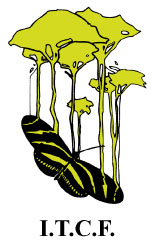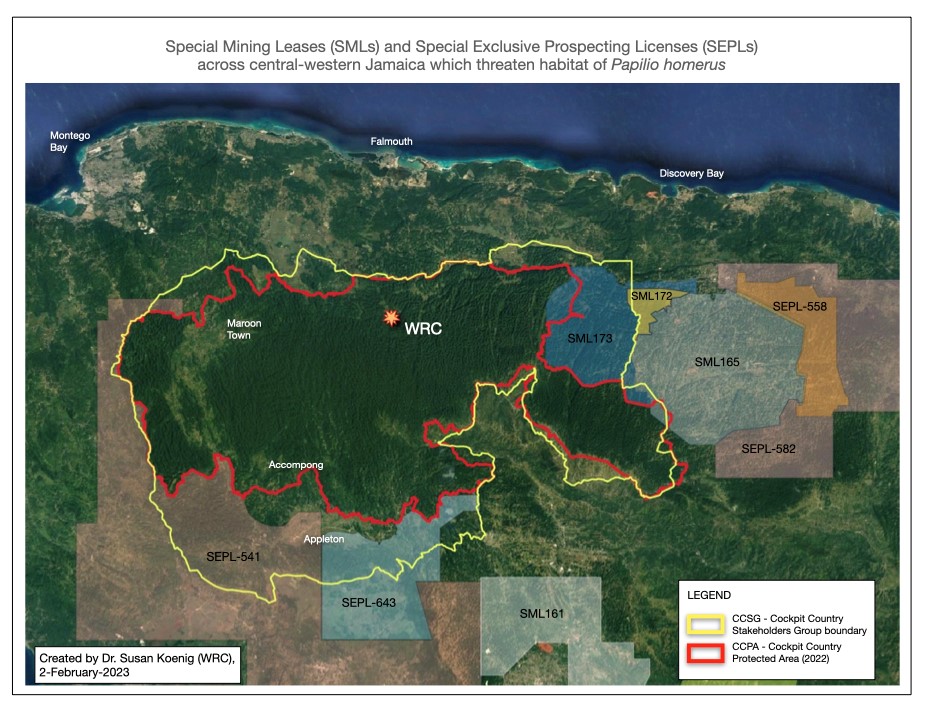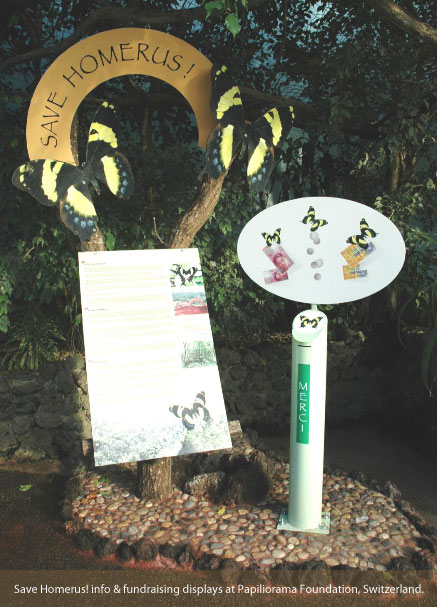
In the largest remaining stretch of tropical forest, deep in the hills of Western Jamaica known as Cockpit Country, flies a giant among butterflies, the rare and endangered Homerus Swallowtail (Papilio homerus). As local environmentalists continue making great strides in eliminating the threat of bauxite mining, this majestic butterfly has become the delicate ambassador of this globally unique landscape.
For almost 20 years, several partners in conservation have been teamed up in an alliance to try and save Homerus and Cockpit Country (www.cockpitcountry.com). The project, implemented in the field by the Windsor Research Centre (WCR) of Jamaica, originally received financial support from the Dutch Zoo Conservation Fund (DZCF) as well as the International Tropical Conservation Fund (ITCF, www.itcfund.org). In 2006, the International Association of Butterfly Exhibitors and Suppliers (www.iabes.org) joined the effort.
IABES’ role is not only to spread the word about the necessity to preserve butterflies and their habitats - one of the major aims of IABES’ members in the first place -, but also to do something very concrete for a highly threatened butterfly. Through its Conservation Committee, IABES coordinates activities between partners within the project, and organizes fundraising within IABES.
All IABES members contribute towards the Homerus project, as a part of the membership dues dedicated to conservation. Besides this a number of IABES member institutions do active fundraising (list at the bottom of the page).
Save Homerus Alliance
Facts on the Homerus Swallowtail
- In 1988, the Homerus Swallowtail was listed in the World's top twelve endangered species of all categories by the IUCN; protected as an Appendix I species of CITES and by the Jamaican Wild Life Protection Act of 1945.
- As the largest species of the genus Papilio in the world and the largest butterfly in the Western Hemisphere, this rare butterfly once inhabited most of Jamaica but has now dwindled into only two tiny populations: an eastern population, found where the Blue Mountains and John Crow Mountains merge, and a western population in the Cockpit Country.
- The Homerus Swallowtail larvae feed on Hernandia catalpifolia and H. jamaicensis, plants which are both endemic to Jamaica, and development takes a long 84 days from egg to the emerged adult.
- Its adult numbers fluctuate rapidly, with peaks in July/August each year
- In 2022 the Government of Jamaica established the 78,024-hectare Cockpit Country Protected Area (CCPA) and closed this area to all prospecting and mining of bauxite. While prohibiting mining, even in a protected area, is unprecedented on Jamaica, unfortunately the Government intentionally excluded from the CCPA regions of Cockpit Country – including areas used by the Homerus Swallowtail – so as to still allow bauxite mining across swathes of Cockpit Country. Unfortunately, the CCPA only protects about three-quarters of the Cockpit Country habitat needed by the Homerus Swallowtail to survive.
- Also endangering the Homerus Swallowtail in Cockpit Country are loss of forest canopy cover from other human activities such as widening roads and illegal collecting.
|
How can we Save Homerus?
The IABES Conservation Committee, together with its partners and foremost the Windsor Research Centre of Jamaica undertook strategic actions for reducing and eliminating the mining threat to the Cockpit Country of Jamaica, habitat of the endangered Homerus swallowtail. These actions included:
- Defining the boundary of Cockpit Country. Although the “upside egg carton” appearance of the landform is easily recognizable from the air, there had been a number of amorphous boundaries presented for Cockpit Country over the centuries. These boundaries often merely highlighted the academic interest of whomever presented a new boundary. What we did was consolidate all information – data on geology & morphology, hydrology of the cockpit karst underground aquifer, the distributions of plants and animals known to occur only in Cockpit Country, and cultural heritage. By overlaying all of these data layers, we let Cockpit Country define itself. Through our Save Homerus project, WRC’s Mike Schwartz put in Herculean efforts to visit (and revisit many times!) all local communities around Cockpit Country, to arm them with the facts as to why they were Cockpit Country communities and to develop a sense of “ownership” and pride for their unique place in the World. Armed with knowledge, communities successfully advocated for the correct boundary, what is recognized by all as the Cockpit Country Stakeholders Group (CCSG) Boundary. Without Mike, who sadly died in early 2018, this community-based championing of Cockpit Country would have never materialized.
- Advocating for the CCSG Boundary: it’s not merely a line, it’s about life-sustaining ecosystem services. When in November 2017 Jamaica’s Prime Minister presented a draft boundary for a protected area, with assurances that it was identified through good science, it was obvious that important areas of Cockpit Country were being excluded from the CCPA to facilitate mining interests. We were particularly concerned for areas being sacrificed in the south and southwest, as well as in the northeast. Luckily, the Save Homerus alliance was not alone in its concerns and in January 2021 a claim was filed in Jamaica’s Supreme Court outlining how bauxite mining in northeastern Cockpit Country will cause irreversible ecological damage. Such damage is a breach of every citizen’s constitutional right to a healthy and productive environment. WRC’s Dr. Susan Koenig was appointed by the Supreme Court as an expert in Forests, Flora and Fauna and carefully detailed why the area in the northeast is, indeed, Cockpit Country. She also presented scientific field data to help the court understand the impacts of mining and demonstrated how mining interests have deceived the public for decades as to how mining damages the environment and public health. You can find Dr. Susan’s report via a link on WRC’s website: https://cockpitcountry.com/CCExpertReport.html We are pleased to report that our many years of dogged determination are finally paying off: in January 2023, an injunction was issued to stop all mining activities in northeastern Cockpit Country until the Supreme Court case is heard (Nov-Dec 2023) and a decision is rendered. This injunction against mining is unprecedented for environmental justice in Jamaica.
- Participatory conservation planning: symposia to bring together Homerus stakeholders. On October 28th 2019, we convened a second symposium in Kingston, Jamaica, which allowed us to review our progress and update recommendations since our first successful symposium held in Kingston on the 19th of April 2010. For the second symposium, we expanded beyond Cockpit Country to include colleagues who look after the Homerus population in the Blue and John Crow Mountains National Park. We discussed not only the outstanding need to determine whether Papilio homerus is a single species (and what this implies for the management of the two populations) but also how climate change may already be impacting the microclimate conditions Homerus needs for long-term survival. As with the first Symposium, we share information with all key actors within the Government of Jamaica, particularly the National Environmental and Planning Agency (NEPA), which has responsibility for the Jamaican Giant Swallowtail Recovery Plan. The proceedings of the first 2010 Symposium can be downloaded here. And the proceedings of the second 2019 Symposium can be downloaded here.
|
|
|
HELP SAVE HOMERUS !
If you are an butterfly related institution / IABES member:
- Do passive fundraising, by pledging x $ cent(s) per visitor per year (e.g. 30’000 visitors @ 5 cents/visitor = US$1,500 )
- Fundraise in your institution with the help of a display (see below)
- Organise special campaigns / events
- Encourage your visitors to become Friends of Homerus
- Link these pages to your website
If you are an Individual:
- Make a donation and spread the news.
Account holder: Papiliorama - IABES (Please use both, otherwise the transaction will not work, thank you!)
Swift/BIC: BEFRCH22
IBAN: CH84 0076 8300 1536 5460 2
Bank Address:
Freiburger Kantonalbank
Bahnhofstrasse 2
3210 Kerzers
Switzerland
- If you have a website, include the Save Homerus banner on your blog/website and link to this page
PLEASE JOIN US! It will not cost you much to set-up your own campaign, but the results will be beneficial to both you and the project. Any amount you may fundraise will help, and together we can make a difference and save this amazing and endangered giant.
To make a pledge and start your fundraising activity, please email "Yes we will Save Homerus!" to This email address is being protected from spambots. You need JavaScript enabled to view it.
|







